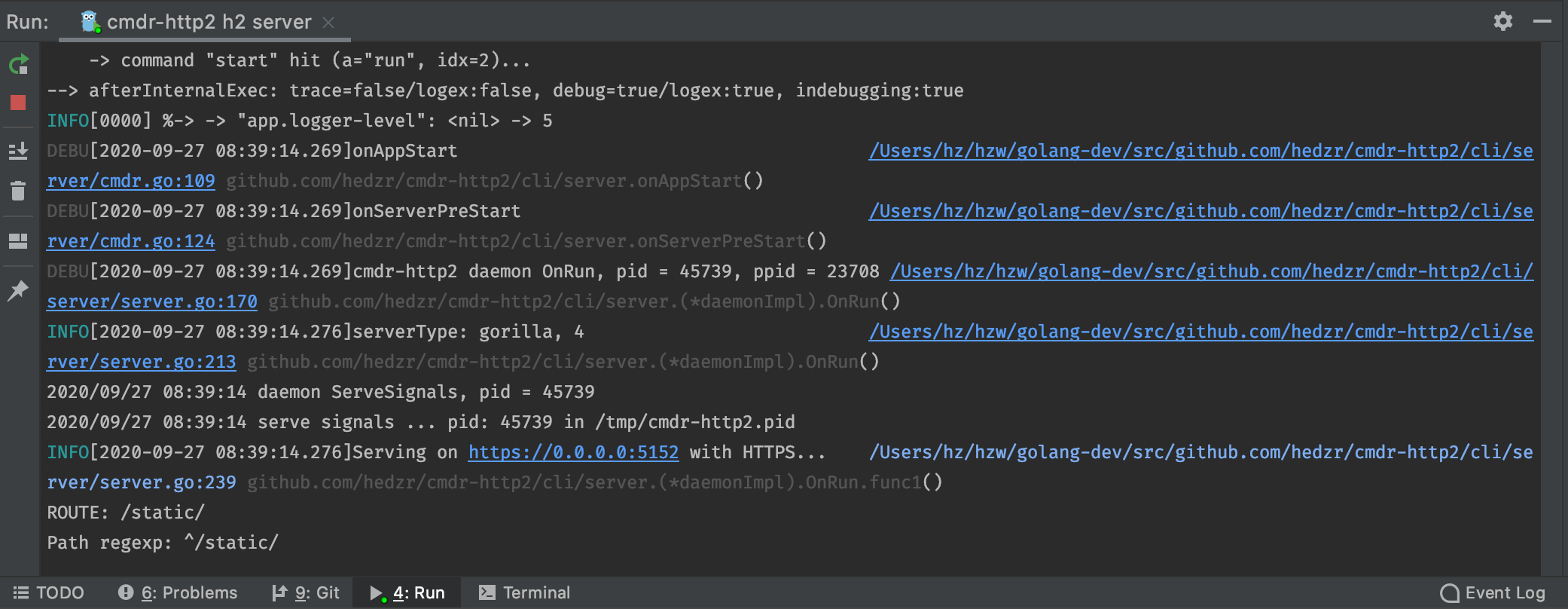ARCHIVED : see hedzr/is and hedzr/logg.
an enhancement for logrus. logex attaches the context caller info to the logging output.
Since v1.6.0,
logexremove the adapters to zap and zerolog.The only shipped adapter is logrus.
The original codes moved to
./_excluded/.The primary reason is for reducing the target binary size. Those adapters imports the more third-party codes and can't be optimized due its refers are in our adapters.
So the only way to avoid importing the unnecessary libs is, remove them from our logex framework and allow you adapt them back again when you really want them.
Since v1.5.56,
logexmoved to Go Modules 1.17 and higher, the lower versions can't be supported.Since v1.2.0,
logexallows switching the logging backends (such as logrus, zap, ...) transparently.
- Pre-setup logging backends with clickable caller info: logrus or zap
- Generic logging interface to cover the various logging backends via:
log.Logger,build.New(config)- allow registering custom logging backend by build.RegisterBuilder(backendName, log.BuilderFunc) `.
-
v1.6.26
- security patch: upgrade golang.org/x/crypto to 0.17.0
-
v1.6.25
- upgrade deps
-
v1.6.23
- upgraded deps
-
v1.6.21
- upgraded deps
-
v1.6.19
- upgraded deps
-
v1.6.18
- upgraded
hedzr/log,hedzr/errors.v3
- upgraded
-
v1.6.17
- upgraded
hedzr/log
- upgraded
-
v1.6.15
- unify detectors api entry to
detectspkg, user can ignorebuildtagsandstatesin readonly accessing.
- unify detectors api entry to
-
v1.6.9
- added a func
exec.LookPathdeleted at earlier version
- added a func
-
v1.6.7
- upgrade deps
-
v1.6.5
- better output with error format
- upgrade deps
-
v1.6.3
- better error format
-
v1.6.1
- upgrade
hedzr/logto support: pass nil tolog.Fatal/Panicwill safely return to caller.
- upgrade
-
v1.6.0
- upgrade errors.v3 to compliant with go1.20+.
- BREAK: removed adapters to zap and zerolog to reduce binary size
-
v1.5.57
- fixed
GetExecutablePath().
Old implements might return an invalid path string if a searchable executable is invoking from current directory.
- fixed
We provide the ability to switch logging backends transparently now.
The supported backends currently are: logrus, zag, zerolog.
A sample config file looks like:
app:
# runmode: devel # devel, prod
logger:
# The field 'level' will be reset to "debug" while the app is started up within a debugger
# available values are:
# "disable"/"off", "panic", "fatal", "error", "warn", "info", "debug", "trace"
level: info
format: text # text, json, logfmt, ...
backend: sugar # zap, sugar(sugared-zap) or logrus, zerolog
target: file # console, file
directory: /var/log/$APPNAMELoad it to Config structure:
import "github.com/hedzr/log"
var config *log.LoggerConfig = log.NewLoggerConfig()
// ...And build the backend:
import "github.com/hedzr/logex/build"
logger := build.New(config)
logger.Debugf("int value = %v", intVal)import "github.com/hedzr/logex/logx/logrus"
logrus.New(level string, traceMode, debugMode bool, opts ...Opt)
import "github.com/hedzr/logex/logx/zap"
zap.New(level string, traceMode, debugMode bool, opts ...Opt)
import "github.com/hedzr/logex/logx/zap/sugar"
sugar.New(level string, traceMode, debugMode bool, opts ...Opt)
import "github.com/hedzr/logex/logx/zerolog"
zerolog.New(level string, traceMode, debugMode bool, opts ...Opt)import "github.com/hedzr/logex/build"
// config:=build.NewLoggerConfig()
config := build.NewLoggerConfigWith(true, "logrus", "debug")
logger := build.New(config)
logger.Debugf("int value = %v", intVal)That's all stocked.
You can wrap a logging backend with log.Logger and register it into logex/build. Why we should do it like this? A universal logger creating interface from logex/build will simplify the application initiliazing coding, esp. in a framework.
import "github.com/hedzr/logex/build"
build.RegisterBuilder("someone", createSomeLogger)
func createSomeLogger(config *log.LoggerConfig) log.Logger {
//... wrapping your logging backend to log.Logger
}
// and use it:
build.New(build.NewLoggerConfigWith(true, "someone", "debug"))
build.New(build.NewLoggerConfigWith(false, "someone", "info"))If you are writing logging func wrappers, you might ignore the extra caller frames for those wrappers:
func wrong(err error, fmt string, args interface{}) {
logrus.WithError(err).WithFields(logrus.Fields{
logex.SKIP: 1, // ignore wrong() frame
}).Errorf(fmt, args)
}
func wrongInner(err error, fields logrus.Fields, fmt string, args interface{}) {
logrus.WithError(err).WithFields(fields).Errorf(fmt, args)
}
func wrongwrong(err error, fmt string, args interface{}) {
wrongInner(err, logrus.Fields{
logex.SKIP: 2, // ignore wrongwrong() and wrongInner() frame
}, fmt, args...)
}The codes is copied from:
And in a test function, you could code now:
func TestFoo(t *testing.T) {
defer logex.CaptureLog(t).Release()
// …
}MIT




